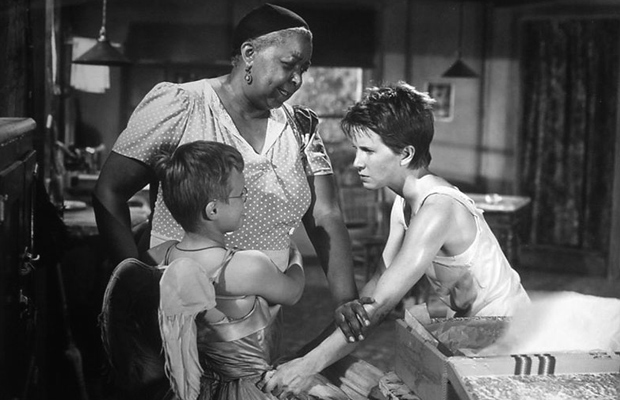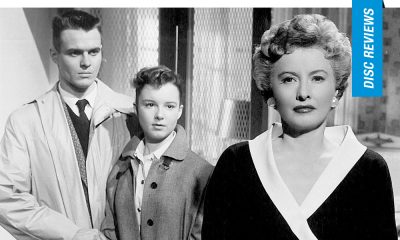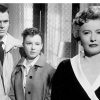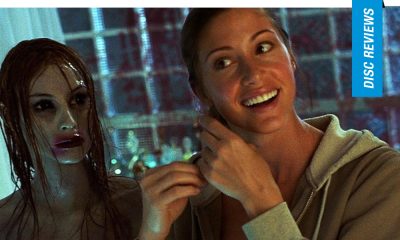Disc Reviews
The Member of the Wedding | Blu-ray Review
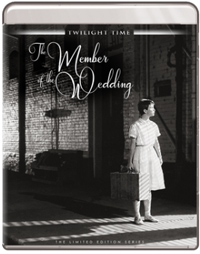 Carson McCullers remains one of the greatest unsung talents of American literature, her significant oeuvre dripping with Southern Gothic, and (as is equally the case with Flannery O’Conner and Edna Ferber) still unfortunately overshadowed by something like Harper Lee’s To Kill a Mockingbird generations later. As is the case with many famed novelists, some of her best known works are still without equal cinematic adaptations, but the first and best adaptation of her work is Fred Zinnemann’s 1952 version of her debut novel, The Member of the Wedding, which was first a successful stage play. Despite being twenty-six years old at the time, Julie Harris manages what would be nearly impossible today playing a twelve year old adolescent on screen, and yet she inhabits this role with outstanding conviction.
Carson McCullers remains one of the greatest unsung talents of American literature, her significant oeuvre dripping with Southern Gothic, and (as is equally the case with Flannery O’Conner and Edna Ferber) still unfortunately overshadowed by something like Harper Lee’s To Kill a Mockingbird generations later. As is the case with many famed novelists, some of her best known works are still without equal cinematic adaptations, but the first and best adaptation of her work is Fred Zinnemann’s 1952 version of her debut novel, The Member of the Wedding, which was first a successful stage play. Despite being twenty-six years old at the time, Julie Harris manages what would be nearly impossible today playing a twelve year old adolescent on screen, and yet she inhabits this role with outstanding conviction.
Twelve year old Frankie Addams (Julie Harris) is an isolated tomboy, the death of her mother having assisted her ability to resist the usual expectations placed upon young girls. Instead, she’s raised by the family maid, Berenice (Ethel Waters), a caring woman unsure of how to assist Frankie and her increasing emotional upsets, while Frankie’s only other friend is a six year old cousin, John Henry West (Brandon De Wilde). When Frankie learns her older brother is about to be married, she’s immediately distressed, insistent that the occasion must be an opportunity for her to get out of their rural, constricting town, where the other girls her age actively shun her. In the hours leading up to the wedding, Berenice must coax some sense into the girl while simultaneously dealing with simmering tensions with her own kin.
Many have lauded The Member of the Wedding for its universality as a tender coming of age story, and yet, the power of McCullers’ characterizations resist the clichéd banality which have come to define such narratives in modern cinema. Frankie’s rejection of gender norms and feminine expectations creates an immediate queer rhythm to the film, as it is why she has been rejected by her ‘normal’ peers. A sequence where she dons a showy dress she has chosen to wear to the wedding is a case in point, reflecting the yoke of feminine expectation which obviously doesn’t favor the young girl (to a lesser extent, the John Henry West character is also portrayed as an effeminate young boy, one who will soon be in Frankie’s shoes and forced to change his behaviors).
Likewise, Frankie’s relationship with Berenice also makes this more than a mere coming of age film. Berenice’s mothering of Frankie is all the more endearing because every weary glance from Waters indicates she knows it is a nurturing relationship about to be rudely halted when Frankie enters ‘society.’ When Berenice gently suggests Frankie should focus her attentions on finding a young white boy her age, their predetermined separation based on atrocious racially defined social codes grants this an underlying bitter aftertaste.
Every so often, new versions of McCullers’ works surface, such as a 1997 television adaptation of The Member of the Wedding, or a 1991 film version of The Ballad of the Sad Café, mounted by character actor Simon Callow and starring Vanessa Redgrave. But the late 60s featured the two other most prominent attempts at adapting her novels, including Robert Ellis Miller’s 1968 version of her most famous work, The Heart is a Lonely Hunter, and John Huston’s delightfully perverse (and highly underrated) Reflections in a Golden Eye (1967).
Zinnemann, who also helmed iconic Western High Noon the very same year, seems highly dependent on the stage version of the material, with nearly all of the action taking place in the sweltering Addams kitchen. DP Hal Mohr (a two time Oscar winner, who also worked on Lang’s Rancho Notorious, as well as the The Jazz Singer) gets inventive with space in the frame, assisted by the anxious flurry of Harris’ energetic performance.
Harris, who originated the role on Broadway, makes her film debut and scored an Oscar nomination for Best Actress (she lost to Shirley Booth, who won an adaptation of William Inge’s play Come Back, Little Sheba), and it’s a restless, desperate performance of an adolescent actively resisting the expectations of maturity and adulthood which will demand her graduation into an appropriately feminine white woman. But as winning as Harris is as one of cinema’s most heralded tomboys, it’s co-star Ethel Waters who steals the show, her character representative of McCullers’ subtexts regarding racial disparities with the same audaciousness as something like Faulkner’s 1932 novel Light in August. The repartee between Frankie and Berenice is phenomenal, if mostly for the apparent resignation of Waters’ character, who is more or less on equal ground with the white teenager, but acknowledges it won’t be long before Frankie drifts on to the superior social code designated for her kind.
The final sequences, where Frankie has already accepted the role of femininity based on her wardrobe (and the presence of a male peer) is left to mourn the passing of Honey, a black supporting character who is victim of an insidious hate crime, a numbingly prescient plot point, alive and well in the virulent attitude toward black males by law enforcement in the US today. Waters, who did score an Oscar nod for her role in Elia Kazan’s Pinky (1949), deserved more acknowledgment here in a warm, robust, and heartfelt portrayal as Berenice, even if Zinnemann’s film (adapted by Edna and Edward Anhalt) waters down McCullers’ subtexts regarding her character’s pleas and dreams for a world where racial identity won’t be so clearly delineated, a day when humans won’t be able to separate themselves based on the color of their skin.
Disc Review:
This limited edition (3,000 units) transfer from Twilight Time looks superb in 1.33:1 high definition. Hal Mohr’s cinematography is impressive considering the limited locales, and the cramped kitchen, which provides a majority of the action, comes to feel like a comfortable, nurturing safe zone. Likewise, composer Alex North’s score (available on the disc as an isolated track) comes through clearly. Additionally, audio commentary is available from singer/songwriter Suzanne Vega, and film historians Derek Botelho and David Del Valle.
The World of Carson McCullers:
This fifteen minute segment discusses the work of author Carson McCullers through author and Professor Virginia Spencer Carr.
The Journey from Stage to Film:
Kevin Spacey opens this ten minute segment on adapting plays for the screen (pointing out the rarity of this film being one where the original stage actors were able to recreate their stage roles) and Stanley Kramer’s wife Karen Kramer speaks on casting and production.
Introduction by Karen Kramer:
Karen Kramer briefly introduces the film.
Final Thoughts:
Zinnemann manages to retain McCullers’ narrative poetry in this sterling adaptation (in ways producer Stanley Kramer simply wouldn’t have been capable of if he’d chosen to direct), and remains one of those aching, forlorn vintage classics worthy of greater renown.
Film Review: ★★★★/☆☆☆☆☆
Disc Review: ★★★★/☆☆☆☆☆



